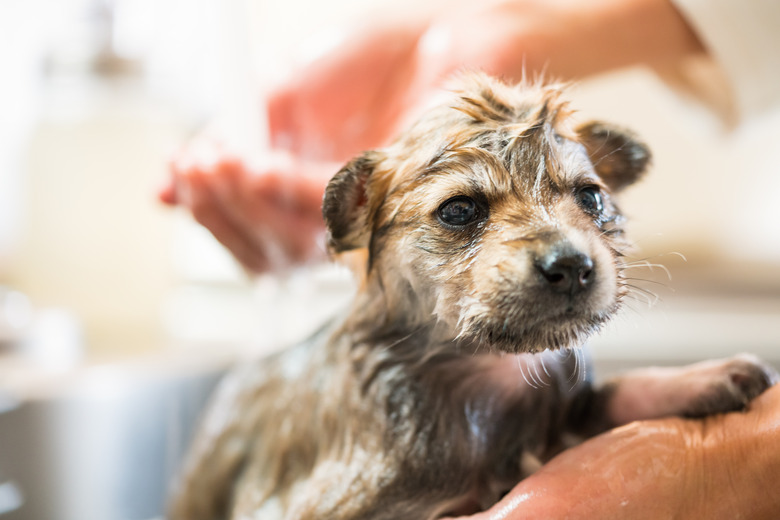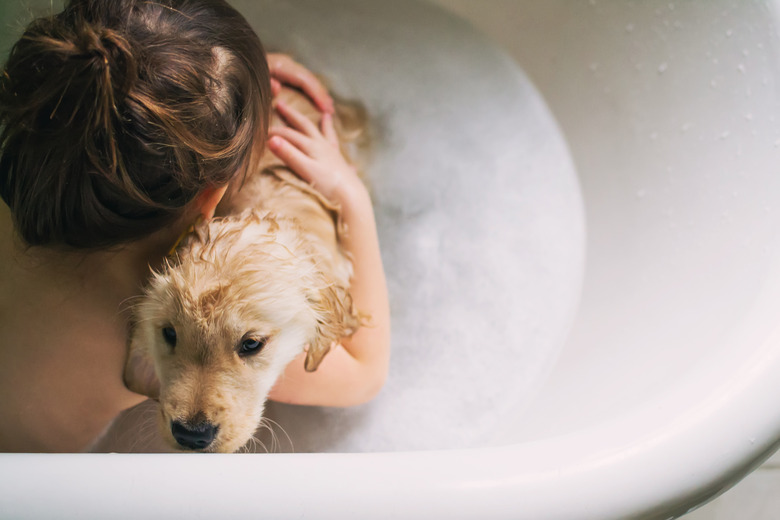Flea Treatment For Puppies Under 12 Weeks
Are There Safe Flea Treatment for Puppies Under 12 Weeks?
Just as puppies grow considerably with each passing week, the most effective flea treatment for baby canines changes rapidly. Preventing fleas is the best way to keep them off very young puppies. Dr. Shagufta Mulla, a veterinarian with a DVM degree from Colorado State University with 20 years of experience as a small animal veterinarian, told us that mother dogs should remain on flea preventives throughout their pregnancy. Some flea control products are safe for pregnant and lactating dogs, and your veterinarian can advise you on which preventives to use. Once your puppy passes the 12-week mark, you can use most commercial flea preventives on them, but always consult your veterinarian beforehand.
Dog flea treatment for newborn puppies
Dog flea treatment for newborn puppies
It's not safe to use commercial flea treatments on very young puppies. The best way to remove fleas from your new puppy in their first few weeks of life is via a gentle daily flea combing.
Replace your dog's bedding in the whelping box and vacuum your house thoroughly, removing the contents of the vacuum cleaner bag. This will help to remove any flea eggs before they hatch into flea larvae, preventing the flea life cycle from continuing. If a puppy is experiencing a lot of flea bites take them to the veterinarian for treatment. A flea infestation can prove fatal to puppies, as the parasites might deplete so much blood from your puppy that it causes anemia.
Flea treatment for 4-week-old puppies
Flea treatment for 4-week-old puppies
Puppies at least 4 weeks of age and weighing 2 pounds or more can receive Capstar for fast-acting flea removal. The active ingredient in this over-the-counter product, nitenpyram, works in just a half hour after the puppy consumes the medication. You can see fleas jumping off the puppy. Capstar kills adult fleas by paralyzing their nervous system. However, nitenpyram doesn't keep fleas off pets long term — its effects only last about 48 hours.
You can give puppies a daily tablet, but there's one important caveat: You must make sure your puppy weighs at least 2 pounds when receiving Capstar. That's not the case in many-month-old canines. Small dogs and undersize puppies might suffer from serious side effects, including neurological problems. Don't give Capstar to a puppy showing any signs of illness, even if they are in the correct weight and age range.
"Keeping up with environmental flea control in your home is always important but particularly so when your puppy is still too young to take longer-lasting preventatives," says Dr. Mulla.
Flea treatment for 6-week-old puppies
Flea treatment for 6-week-old puppies
At the age of 6 weeks, puppies can start receiving the prescription topical flea preventive Revolution, containing selamectin. This once-a-month drug also prevents roundworms and hookworms in your pup along with ear mites and ticks. It's also a heartworm preventive, but 6-week-old puppies are generally too young for heartworm exposure. If your puppy remains on Revolution as they grow, they should stay heartworm-negative.
Your veterinarian will give your puppy a blood test prior to prescribing Revolution and will require an annual blood test thereafter to ensure that they are heartworm-free. "Annual testing is done because sometimes doses are accidentally missed or are given late," explains Dr. Mulla. "Also, for oral preventatives, a dog might spit it out without it being noticed. And with topical, some of the product can get rubbed off."
Flea treatment for puppies 8 weeks and older
Flea treatment for puppies 8 weeks and older
Once a puppy reaches the age of 8 weeks and 5 pounds, they can receive many commercial flea and tick preventives, including over-the-counter and prescription medications. "The weight of 5 pounds is important for toy breeds," says Dr. Mulla. Frontline Plus, containing (S)-methoprene and fipronil and available in topical or spray form, can be used on puppies of this age. It repels fleas, offers tick protection, and controls chewing lice. "There are websites that say you can use it on puppies at a much younger age, even 2 days old," explains Dr. Mulla. "That's true for some countries like the U.K., but in the United States, it is only approved for use in dogs 8 weeks of age and older."
When to use a flea & tick bath for puppies
When to use a flea & tick bath for puppies
Your veterinarian might recommend using a nonmedicated flea bath for puppies under the age of 12 weeks to get rid of fleas if the animal is heavily infested. "Even a regular soapy bath will drown adult fleas," says Dr. Mulla, helping you address the problem. Use only the product that your veterinarian recommends and use it only on your puppy. Some flea baths for puppies can be toxic to cats and vice versa. "If your animal is heavily infested, you may be advised to use a product like Capstar as well, if your puppy is the right age and weight," says Dr. Mulla.
Start by washing your puppy's neck and be sure to get them wet down to the skin. Apply the shampoo around the puppy's neck and then thoroughly scrub the neck area. This method helps to prevent the fleas from traveling up to the puppy's eyes and ears, where it's more difficult to wash. Once you've washed the puppy's neck, you can proceed to wash the rest of their body. If you notice that the water appears a rust color, this is from the flea dirt, which contains blood from feeding.
After using the appropriate flea shampoo in a warm-water bath, thoroughly towel dry the puppy. If necessary, use a hair dryer to dry them but avoid using the high setting. "And keep the hair dryer moving," says Dr. Mulla, so their skin doesn't get too hot. It's vital that the puppy stay warm, as it's hard for them to regulate their body temperature, and they could easily get sick.
The bottom line
The bottom line
Unlike adult dogs, young puppies are unable to use the usual long-term flea preventives. One of the best flea prevention solutions for a puppy under 8 weeks of age is to keep the home environment free of fleas. Daily flea combing can also help to safely remove fleas from a young puppy. As your puppy gets older, there are options for chewable and topical flea preventives. Contact your veterinarian to discuss the best solution for your puppy based on their age and size.


